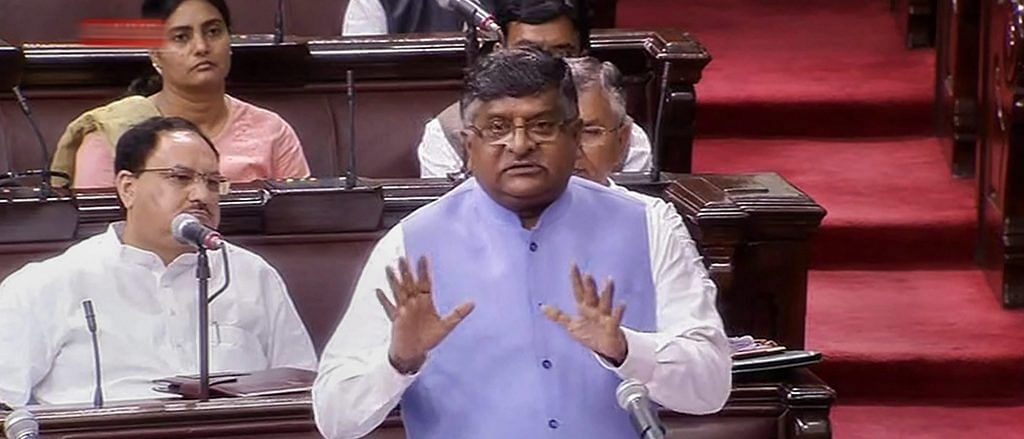New Delhi: Senior BJP leader Ravi Shankar Prasad was re-inducted into Prime Minister Narendra Modi’s new cabinet as the law minister Friday.
Prasad, the MP from Patna Sahib, had briefly lost this position to Sadananda Gowda in a cabinet reshuffle in November 2014.
Besides law minister, Prasad was also appointed as the minister of communications, electronics and information technology.
Backlog of cases and vacancies have always clogged the judiciary, posing the same conundrum for law ministers for years now. Prasad, therefore, has to address these challenges in his second stint too.
Challenges awaiting Prasad
Impartial complaint redressal system: One of the biggest offshoots of the controversy surrounding the sexual harassment allegations against Chief Justice of India Ranjan Gogoi has been the demand to put in place a proper complaint redressal system to probe such accusations.
The issue also gained traction when allegations of impropriety were levelled against former CJI Dipak Misra.
Also read: Modi cabinet: Here’s the full list of who got which ministry
Even though the SC judgment in the Veeraswamy case provides a mechanism to deal with criminal complaints against judges of constitutional courts, the position on the procedure to be followed when the CJI himself is under the scanner is unclear.
To remedy the situation, the new government could take a re-look at the ‘The Judicial Standards and Accountability Bill’ that was passed by the Lok Sabha to enforce greater accountability in the judiciary. The Bill, which could not be discussed in the Rajya Sabha, lapsed due to the dissolution of the 15th Lok Sabha.
Post-retirement jobs: No government in India has so far shied away from handing out jobs to retired judges and this one was no different, having appointed at least 12 judges after their retirement to various posts.
The debate on the propriety of such appointments flares up every time a judge is handed out a post-retirement job, raising questions on the judiciary’s independence and integrity. This necessitates exploration of suggestions such as increase of retirement age of judges and a mandatory cooling-off period after the judges’ retirement.
Appointment of judges: While a record number of judges were appointed in the last five years, there was marked delay and disagreements over the recommendations made by the Supreme Court collegium with the most prominent being the elevation of Justice K.M. Joseph. As remarked by former apex court judge Kurian Joseph, this selective delay in appointments of certain judges amounts to interference of the executive in the independence of the judiciary.
Therefore, the foremost step to address judicial vacancies has to be finalisation of the Memorandum of Procedure (MoP), which has been lying with the Centre since then CJI J.S. Khehar finalised it in March 2017. The long ignored Article 224A of the Constitution can be explored as well to appoint retired judges as ad hoc judges.
Effective functioning of Tribunals: The ailing tribunal system needs an overhaul. It needs to be brought under a nodal agency that would facilitate immediate appointments to fill quorum requirements and provide the necessary infrastructure.
Additionally, the establishment of an ‘Indian Tribunals Service’ by the same nodal agency would address the conflict of interest that is often alleged to arise due to post-retirement jobs offered to judges.
Also read: Maneka Gandhi named pro-tem Speaker, son Varun Gandhi kept out of new Modi govt
Achievements in the past five years
During Prasad’s tenure, he had spearheaded a massive push in digitisation of courts. More than 1,400 obsolete laws were repealed, a record number of judges were appointed, and several laws were introduced to facilitate ease of doing business.
Further, special courts were established to adjudicate cases against lawmakers, albeit pursuant to a petition filed in the Supreme Court. The Nation Judicial Data Grid was also launched and appreciated by the stakeholders.
Prasad’s tenure will, however, be remembered for the marked upswing in the conflict between the executive and the judiciary as well as within the judiciary. The unprecedented press conference held by four senior Supreme Court judges — Justice (retired) J. Chelameswar, incumbent CJI Gogoi, Justice (retired) Madan Lokur and Justice (retired) Kurian Joseph — is still a fresh memory.
